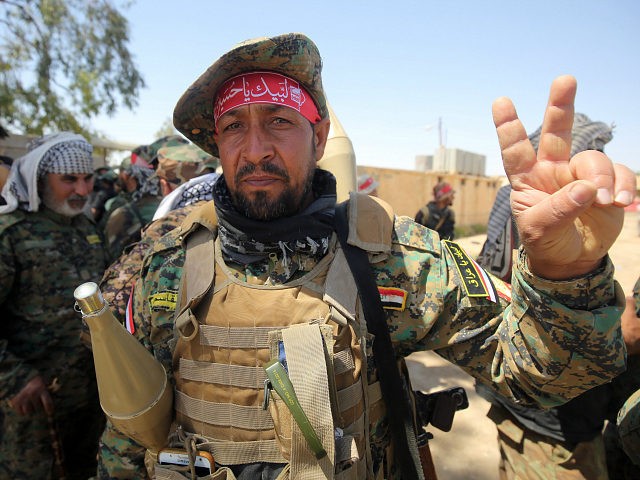The next time post-Islamic State (ISIS/ISIL) Iraq descends into war it will be linked to the Baghdad-sanctioned Popular Mobilization Forces (PMF), an umbrella group of predominantly Iran-backed Shiite militias, an Iran analyst predicted during the 2017 Aspen Security Forum.
During a panel discussion on Iraq’s fight against ISIS at the ongoing event in Colorado, a member of the audience asked about the risk the expanded Iran-backed mission in Iraq poses to the United States military presence.
Iran-backed Shiite militiamen affiliated with the PMU, also known as the Popular Mobilization Forces (PMF) and Hashd al-Shaabi, were linked to U.S. military casualties before the rise of ISIS. Some have also been affiliated with U.S.-designated terrorist groups, namely Hezbollah.
“On the issues of the [Iran-allied] militias, I share your concern profoundly and I think the next war in Iraq is likely to be among the PMF themselves,” declared panelist and author Robin Wright of the U.S. Institute of Peace at the Woodrow Wilson International Center for Scholars in responding to the audience member’s question.
“Again we keep focusing on the [ISIS] militants and there are so many troubling dynamics within Iraqi society,” she explained, noting that “there are somewhere between 63 and 68 different factions within the Popular Mobilization Forces.”
Of those, she said three are prominent “and they are real rivals.” Some experts believe there are between 100,000 and 120,000 PMF fighters in Iraq.
“Once you kind of get rid of ISIS, it will be game over for the spoils, for the influence, and with the elections coming next year, the prime minister says they won’t be allowed to run but we all know they will under some guise,” said Wright.
Echoing other assessments, she suggested that the PMU may become Iran’s political proxy in Iraq much like the Shiite terrorist group Hezbollah in Lebanon.
“I lived in Lebanon for over five years and you can feel the ‘Lebanonization’ in Iraq and that worries me a great deal,” proclaimed the analyst.
The PMU assisted the U.S.-backed Iraqi military in liberating Mosul from ISIS.
American Gen. Stephen Townsend, the top commander of the U.S.-led coalition against ISIS, has praised the PMU for its contributions to the fight against ISIS, noting that that Iran-backed force deserves credit for the “hard-won” victory in Mosul.
Fareed Yasseen, the Shiite-led Iraq ambassador to the United States, defended Iran as a “critical” player in his country’s fight against ISIS, saying that the Islamic Republic provided the nation’s Kurds and military forces with much-needed equipment to combat the terrorist group before the U.S.-led coalition got involved.
Yassen, who also served as a panelist, praised the June 2014 fatwa (Islamic ruling), issued by Iraq’s highest Shiite cleric calling on all able-bodied men to combat ISIS.
The PMU was allegedly formed in response to that particular fatwa.
Although some PMU militias were linked to the deaths of Americans prior to ISIS and have threatened U.S. troops after the group surfaced in Iraq, Amb. Yasseen suggested the Shiite fighters do not pose a threat to Americans in his country.
“Since 2011, there has been nothing, not a single shot fired at any American soldier in Iraq. There’s a difference now with the situation previously—American troops in Iraq are there at the request of the Iraqi government to help us defeat an implacable enemy and even, actually all our neighbors [which includes Iran] see utility in that,” proclaimed the Iraqi envoy. “As to the continuing mission of the United States forces or civilians that’s a decision that will be reached between us, the Iraqi government and the United States.”
Kim Dozier, a CNN global analyst and contributing writer for the Daily Beast who served as the discussion’s moderator, also appeared to support the ambassador’s claim that the Iran-allied PMU fighters do not pose a threat to America’s military presence in Iraq, saying the Shiite militiamen have been told by their leaders not to attack U.S. troops.
“I interviewed Gen. Stephen Townsend back in December and he went on record saying they [U.S.-led coalition] had intercepted communications between Iranian-funded militia groups to their fighters who wanted to attack American troops and the leadership said ‘don’t you dare now,’” said Dozier.
“For how long [that position will last] is a good question, but for now that’s the message coming from the top to the rank and file,” she added.

COMMENTS
Please let us know if you're having issues with commenting.